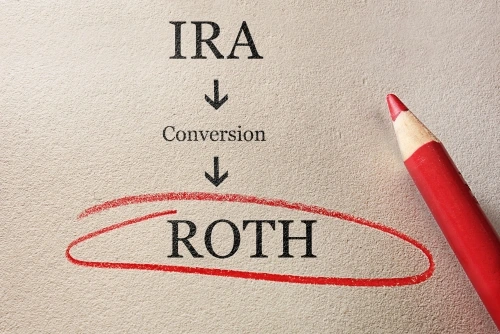A Backdoor Roth IRA is an effective strategy for high-income earners to take advantage of the tax benefits of a Roth IRA, even when their income exceeds the traditional contribution limits.
Join our tax consultant CPAs at Steward Ingram & Cooper, serving clients throughout the Raleigh, Durham, and Chapel Hill areas of North Carolina, as we explain how a Backdoor Roth IRA works, the potential tax advantages, and whether this approach is right for you. Whether you’re planning for retirement or looking to optimize your tax strategy, understanding the nuances of this option can help you make informed decisions for your financial future.
Table of Contents
What is a Backdoor Roth IRA?
A Backdoor Roth IRA is a method that allows high-income individuals to contribute to a Roth IRA despite income limits. It involves making a contribution to a Traditional IRA, which has no income restrictions, and then converting it to a Roth IRA. This strategy provides the tax-free growth and tax-free withdrawals offered by a Roth IRA. While taxes may be due upon conversion, it’s a useful option for those looking to maximize tax-efficient retirement savings.
How Does a Backdoor Roth IRA Work?
A Backdoor Roth IRA allows high-income earners to sidestep Roth IRA income limits by taking advantage of a legal loophole in retirement savings rules.
Contribute to a Traditional IRA
The first step in a Backdoor Roth IRA is to make a non-deductible contribution to a Traditional IRA. There are no income restrictions for contributing to a Traditional IRA, making this an accessible option for high earners.
Convert the Traditional IRA to a Roth IRA
Once the contribution is made, the next step is to convert the funds from the Traditional IRA to a Roth IRA. This conversion process essentially shifts your contributions into a Roth, allowing for tax-free growth and withdrawals in the future.

Understand the Tax Implications
If you made after-tax contributions to your Traditional IRA, there may be little to no tax owed on the conversion. However, if you have other pre-tax contributions in your Traditional IRA, those amounts will be subject to taxes when you convert them to the Roth IRA. The IRS’s pro-rata rule will apply, meaning you may owe taxes on the proportion of pre-tax funds in your total IRA balance.
Continue Contributing Annually
Once the conversion is complete, you can continue making non-deductible contributions to your Traditional IRA each year and repeat the conversion process, effectively building tax-free retirement savings over time.

Backdoor Roth IRA Tax Implications
When executing a Backdoor Roth IRA, understanding the tax implications is crucial to avoid unexpected costs.
Taxes on Pre-Tax Contributions
If your Traditional IRA includes pre-tax contributions, converting those funds to a Roth IRA will trigger a tax event. You’ll owe taxes on the pre-tax portion of the amount converted. This can significantly impact your current tax liability, so it’s important to plan for this expense.
The Pro-Rata Rule
The IRS applies the pro-rata rule to conversions, which means that if you have both pre-tax and after-tax contributions in any of your IRAs, the taxable and non-taxable portions are calculated proportionally. For example, if 70% of your total IRA balance is pre-tax contributions, then 70% of your conversion will be taxable, regardless of how much after-tax money you contribute for the Backdoor Roth.
Timing and Conversion Strategy
It’s often wise to convert funds during a year when your taxable income is lower, which may reduce the tax burden of the conversion. Additionally, making the conversion soon after contributing to the Traditional IRA can help minimize tax owed, as there is less time for the funds to generate taxable earnings.
Who Can Benefit from a Backdoor Roth IRA?
A Backdoor Roth IRA is particularly beneficial for individuals who exceed the income limits to contribute directly to a Roth IRA but still want to take advantage of its tax-free growth and withdrawals in retirement.
High Income Earners
If your income surpasses the Roth IRA eligibility thresholds, a Backdoor Roth IRA is an effective strategy to bypass these limits and still contribute. It’s a valuable tool for maximizing retirement savings, especially for those in higher tax brackets.
Those Looking for Tax-Free Growth
Anyone interested in growing their retirement savings tax-free can benefit from this strategy. By converting Traditional IRA contributions to a Roth IRA, you can enjoy tax-free growth and future withdrawals, which can make a significant impact over time.
Individuals Without Pre-Tax IRA Funds
Those who do not have existing pre-tax IRA funds will have a smoother, tax-free conversion process. Since there are no pre-tax contributions involved, the conversion won’t trigger any immediate tax liabilities, making it a more straightforward option.
Is a Backdoor Roth IRA Right for You?
Deciding whether a Backdoor Roth IRA is the right strategy for you depends on several key factors. Here are some questions to consider.
Are You Exceeding Roth IRA Income Limits?
If your income surpasses the IRS limits for contributing directly to a Roth IRA, a Backdoor Roth IRA offers a way to still benefit from Roth’s tax-free growth and withdrawals. This strategy allows you to contribute indirectly and grow your retirement savings efficiently.
Are You Prepared for the Potential Tax Implications?
The tax implications of converting a Traditional IRA to a Roth IRA can be significant, especially if you have pre-tax contributions in other IRAs. Before proceeding, it’s important to assess how much you might owe in taxes during the conversion process and whether this aligns with your financial goals.
Do You Have Existing IRA Funds?
If you already have pre-tax contributions in your Traditional IRA, the conversion could lead to a more complicated tax situation due to the pro-rata rule. However, if your Traditional IRA contains only after-tax contributions, the conversion may be more straightforward with little or no tax liability.
Are You Looking for Long-Term Tax-Free Growth?
A Backdoor Roth IRA can be a smart move if your priority is maximizing tax-free growth over the long term. If you anticipate being in a higher tax bracket during retirement, the tax-free withdrawals from a Roth IRA could provide significant savings.
Consulting with Our CPAs for Guidance
Deciding whether a Backdoor Roth IRA is the right strategy for your retirement plan can be complex, especially when considering the tax implications and potential benefits. Working with a trusted CPA can help you navigate the process and make informed decisions that align with your long-term financial goals.
At Steward Ingram & Cooper, PLLC, our Raleigh-Durham team can provide tax planning guidance to help you determine if a Backdoor Roth IRA is the best option for you. We’ll work with you to evaluate your current retirement accounts, assess potential tax liabilities, and create a plan that maximizes your tax-efficient savings.
Contact Our CPAs Serving Raleigh-Durham-Chapel Hill Today
If you’re considering a Backdoor Roth IRA or need guidance on other retirement strategies, our CPAs at Steward Ingram & Cooper, PLLC are here to help. We serve individuals and businesses across the Raleigh-Durham-Chapel Hill area with personalized tax and financial planning solutions.
Contact us today to schedule a consultation and take the next step toward securing your financial future with confidence. Get started by calling us at (919) 872-0866 or filling out the form below.

